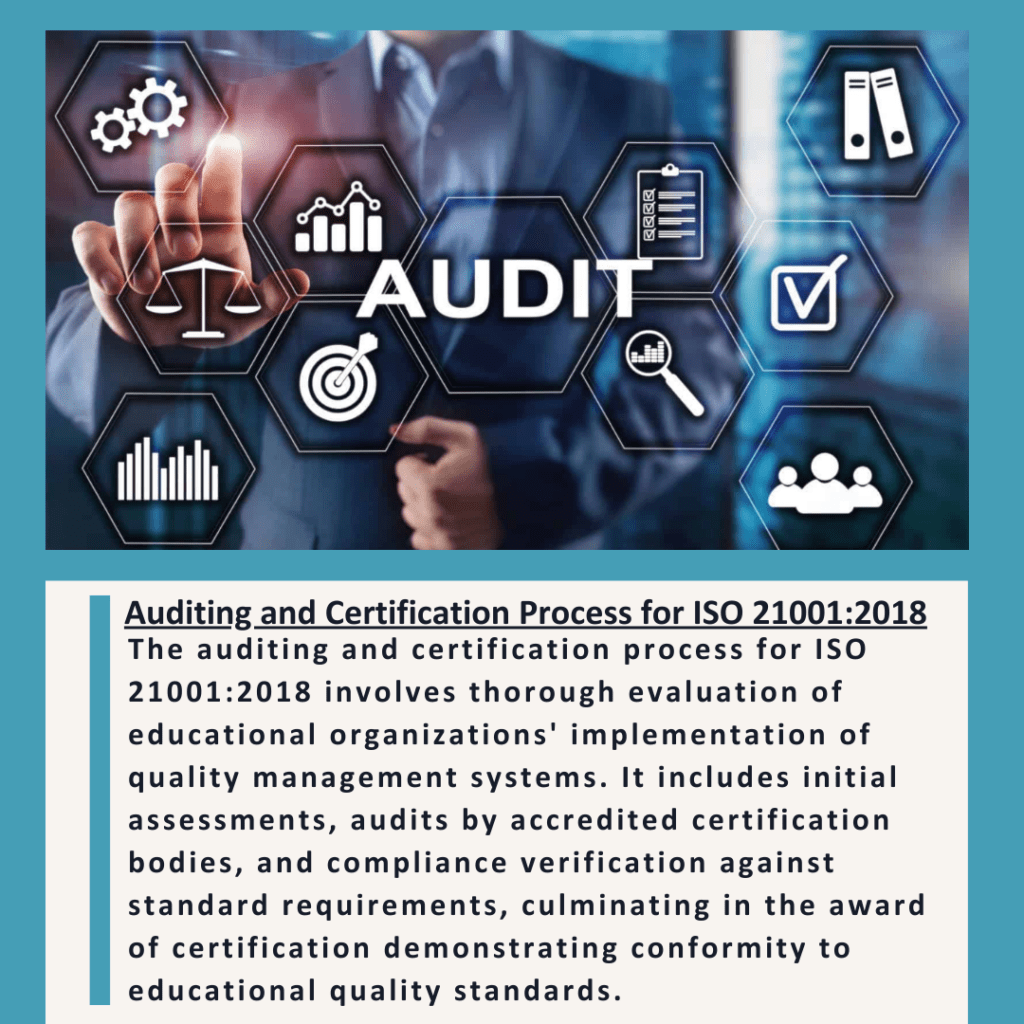Subtotal $0.00

To effectively understand the auditing and certification process for ISO 21001:2018, educational institutions must grasp the key steps involved, from preparation to achieving certification. This comprehensive guide provides insights into what institutions need to know to navigate this process successfully.
Understanding ISO 21001:2018
ISO 21001:2018, Educational organizations — Management systems for educational organizations — Requirements with guidance for use, sets out requirements for a management system that helps educational institutions improve their performance and meet students’ expectations. It is based on the widely recognized ISO 9001 quality management system standard but tailored specifically for educational organizations.
Importance of Certification
Certification to ISO 21001:2018 demonstrates an institution’s commitment to enhancing the quality of its educational services. It provides credibility to stakeholders, including students, parents, staff, and regulatory bodies, that the institution has established effective processes to ensure educational quality and continual improvement.
Auditing Process Overview
Stage 1: Readiness Review
The auditing process typically begins with a Stage 1 audit, also known as a readiness review. During this stage, the auditing team evaluates the institution’s readiness to undergo the full certification audit. Key aspects assessed include:
Documentation Review: Examination of the institution’s quality management system documentation, including policies, procedures, and records.
Gap Analysis: Identification of any gaps between current practices and ISO 21001:2018 requirements.
The outcome of the Stage 1 audit provides valuable feedback and helps the institution prepare effectively for the Stage 2 audit.
Stage 2: Certification Audit
The Stage 2 audit is the main audit where the certification body evaluates the implementation and effectiveness of the institution’s quality management system against ISO 21001:2018 requirements. Key activities during this stage include:
On-Site Audit: Physical visit to the institution to observe processes, interview staff, and verify compliance with ISO 21001:2018.
Sampling of Activities: Examination of a representative sample of educational activities, documentation, and records to ensure conformity with the standard.
The audit team typically includes experienced auditors with knowledge of educational quality management systems. They assess whether the institution meets the requirements of ISO 21001:2018 and identifies opportunities for improvement.
Steps for Educational Institutions
1. Commitment and Leadership
Establishing commitment from top management is crucial. Leadership must endorse and actively support the implementation of ISO 21001:2018, ensuring adequate resources and promoting a culture of quality and continuous improvement throughout the institution.
2. Gap Analysis and Implementation Plan
Conduct a thorough gap analysis to identify areas where current practices align with or diverge from ISO 21001:2018 requirements. Based on the analysis, develop an implementation plan that outlines specific actions, responsibilities, timelines, and resource requirements to address identified gaps.
3. Documented Information
Develop and maintain documented information that defines the scope of the quality management system, including policies, objectives, procedures, and records required by ISO 21001:2018. Documentation should be clear, accessible, and aligned with the institution’s operational processes.
4. Training and Awareness
Provide training and awareness programs to ensure that staff at all levels understand their roles, responsibilities, and the requirements of ISO 21001:2018. Training should cover topics such as quality management principles, process management, and the specific requirements of the standard applicable to their roles.
5. Internal Audits
Conduct internal audits to assess the effectiveness of the quality management system and identify opportunities for improvement. Internal auditors should be trained and competent in auditing techniques and have a thorough understanding of ISO 21001:2018 requirements.
6. Management Review
Hold regular management reviews to evaluate the performance of the quality management system, including its suitability, adequacy, and effectiveness in achieving objectives. Management reviews provide a forum for leadership to assess the institution’s progress towards certification and make informed decisions for improvement.
7. Preparation for Stage 1 Audit
Before the Stage 1 audit, ensure that all necessary documentation and records are prepared, organized, and accessible to auditors. Conduct a mock audit or readiness review to simulate the audit process and identify any remaining gaps or areas needing improvement.
8. Stage 1 Audit (Readiness Review)
During the Stage 1 audit, cooperate fully with auditors and provide accurate information regarding the institution’s readiness for certification. Address any findings or recommendations from the audit team to enhance readiness for the Stage 2 audit.
9. Stage 2 Audit (Certification Audit)
During the Stage 2 audit, demonstrate the effective implementation and operation of the quality management system according to ISO 21001:2018 requirements. Cooperate with auditors, provide access to relevant personnel and facilities, and respond promptly to audit findings or observations.
10. Post-Audit Activities
After the certification audit, address any non-conformities identified by the audit team and implement corrective actions to resolve root causes. Continually monitor and improve the quality management system to maintain compliance with ISO 21001:2018 and enhance educational outcomes.
Benefits of ISO 21001:2018 Certification
Achieving certification to ISO 21001:2018 offers numerous benefits to educational institutions, including:
Enhanced credibility and reputation
Improved student satisfaction and retention
Increased operational efficiency and cost-effectiveness
Alignment with global best practices in educational quality management
Facilitated access to funding and partnerships
Enhanced ability to attract and retain talented staff
Conclusion
Successfully navigating the auditing and certification process for ISO 21001:2018 requires careful planning, commitment from leadership, and collaboration across the institution. By following these steps and maintaining a focus on continual improvement, educational institutions can achieve certification and demonstrate their commitment to providing high-quality education and improving learning outcomes for students.